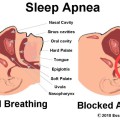Did you know?
The sound of snoring can cause the snorer to wake up an average of 27 times per night, and the poor bed partner, up to 21 times. Talk about a restless night!
This prevents the snorer and their partner from entering into the “Slow Wave Sleep” stage. This is the real deep sleep. Your body uses this for building up of your physical and mental energy. This is where the body gets its true rest.
Bed partners of snorers visit their doctor much more frequently than their counterparts. We have mentioned before that a loud snore can reach up to 85 decibels, but to give you some perspective, did you know that a pneumatic drill also reaches those decibel levels? This high decibel level from snoring can be loud enough to actually cause damage to the human ear. And this can make the snorer highly susceptible to hearing loss.
Perhaps learning the didgeridoo can help the snorer tighten and strengthen those throat muscles, and help with that noise. That is, of course, if you can find one of these in South Africa.
Shakespeare was the first to use the word “snore” as a verb for human snoring. Until then, it meant the same as “snort” and was only really used to describe the noise an animal makes.
“Laugh and the world laughs with you.
Snore, and you sleep alone.”
Anthony Burgess
**Luckily, there is a much easier alternative to be had in the form of Silence Anti-Snoring Throat Spray.
References:
http://www.centerforsoundsleep.com/sleep-disorders/snoring/
http://www.express.co.uk/life-style/top10facts/472778/Top-10-facts-about-snoring







